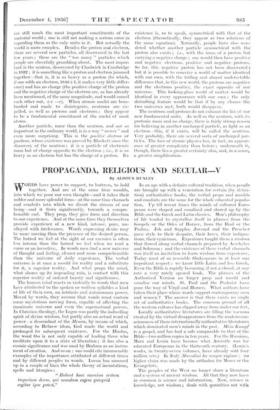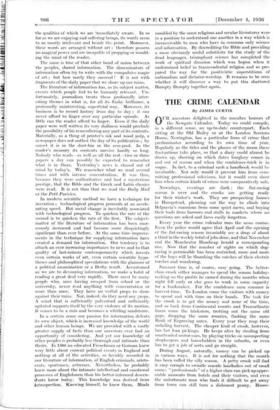PROPAGANDA, RELIGIOUS AND SECULAR -V
By ALDOUS HUXLEY
WORDS have power to support, to buttress, to hold together. And are at the same time moulds, into which we pour our own thought—and it takes their nobler and more splendid form—at the same time channels and conduits into which we divert the stream of our being—and it flows significantly, towards a compre- hensible end. They prop, they give form and direction to our experience. And at the same time they themselves provide experience of a new kind, intense, pure, un- alloyed with irrelevance. Words expressing desire may be more moving than the presence of the desired person. The hatred we feel at the sight of our enemies is often less intense than the hatred we feel when we read a curse or an invective.. In words men find a new universe of thought and feeling, clearer and more comprehensible than the universe of daily experience. The verbal universe is at once a mould for reality and a substitute for it, a superior reality. And what props the mind, what shores up its impending ruin, is contact with this superior reality of ordered beauty and significance.
The human mind reacts so violently to words that men have attributed to the spoken or written syllables a kind of life of their own, an intrinsic and autonomous power. Moved by words, they assume that words must contain some mysterious moving force, capable of affecting the inanimate universe and even the supernatural powers. In Christian theology, the Logos was partly the indwelling spirit of divine wisdom, but partly also an actual word of power—a descendant of the Memra, by means of which, according to Hebrew ideas, God made the world and prolonged its subsequent existence. For the Hindus, the word Om is not only capable of leading those who meditate upon it to a state of liberation ; it has also a cosmic significance and was used by Brahma as an instru- ment of creation. And so on : one could cite innumerable examples of the importance attributed at different times and by different peoples to words. Lucan has summed up in a couple of lines the whole theory of incantations, spells and liturgies : " Habent haec carmina cerium imperiosa deum, qui mundum cogere quicquid cogitur ipse potest." In an age with a definite cultural tradition, when people are brought up with a veneration for certain (by defini- tion) authoritative books, the verbal props and moulds and conduits are the same for the whole educated popula- tion. Lip till recent times the minds of cultured Euro- peans were shaped and canalised and shored up by the Bible and the Greek and Latin classics. Men's philosophy of life tended to crystallise itself in phrases from the Gospels or the Odes of Horace, from the Iliad or the Psalms. Job and Sappho, Juvenal and the Preacher gave style to their despairs, their loves, their indigna- tions, their cynicisms. Experience taught them a Wisdom that flowed along verbal channels prepared by Aeschylus and Solomon ; and the existence of these verbal channels was itself an invitation to learn wisdom from experience. Today most of us resemble Shakespeare in at least one important respect : we know little Latin and less Greek. Even the Bible is rapidly becoming, if not a closed, at any rate a very rarely opened book. The phrases of the Authorised Version no longer prop and mould and canalise our minds. St. Paul and the Psalmist have gone the way of Virgil and Horace. What authors have taken their place whose words support contemporary and women ? The answer is that there exists no single set of authoritative books. The common ground of all the western cultures has slipped away from under our feet.
Locally authoritative literatures arc filling the vacuum created by the virtual disappearance from the modern con- sciousness of those internationally authoritative literatures which dominated men's minds in the past. Mein Kampf is a gospel, and has had a sale comparable to that of the Bible—two million copies in ten years. For the Russians, Marx and Lenin have become what Aristotle was for educated Europeans in the thirteenth century. (Lenin's works, in twenty-seven volumes, have already sold four million sets.) In Italy Mussolini ha sempre ragione ; no higher claim was made by the orthodox for Moses or the Evangelists.
The peoples of the West no longer share a literature and a system of ancient wisdom. All that they now have in common is science and information. Now, science is knowledge, not wisdom ; deals with quantities not with the qualities of which we are ..vilirtediately aware._ In so far as we are enjoying and suffering beings, its words seem to us mostly irrelevant and beside the point. Moreover, these words are arranged without art ; therefore possess no magical power and are incapable of propping or mould- ing the mind of the reader.
The same is true of that other bond of union between the peoples, shared information. The disseminators of information often try to write with the compulsive magic of art ; but how rarely they succeed ! It is not with fragments of the daily paper that we shore up our ruins.
The literature of information has, as its subject matter, events which people feel to be humanly relevant. Un- fortunately, journalism treats these profoundly inter- esting themes in what is, for all its flashy brilliance, a profoundly uninteresting, superficial way. Moreover, its business is to record history from day to day ; it can never afford to linger over any particular episode. As little can the reader afford to linger. Even if the daily paper were well written its very dailiness would preclude the possibility of his remembering any part of its contents. Materially, as a thing of printer's ink and wood pulp, a newspaper does not outlast the day of its publication ; by sunset it is in the dust-bin or the cess-pool. In the • reader's memory its contents survive hardly so long. Nobody who reads—as well as all the rest—two or three papers a day can possibly be expected to remember what is in them. Yesterday's news is chased out of mind by today's. We remember what we read several times and with intense concentration. It was thus, because they were authoritative and had a mysterious prestige, that the Bible and the Greek and Latin classics were read. It is not thus that we read the Daily Mail or the Petit Parisien.
In modern scientific method we have a technique for invention ; technological progress proceeds at an accele- rating speed. But social change is inevitably associated with technological progress. To quicken the rate of the second is to quicken the rate of the first. The subject- matter of the literature of information has been enor- mously increased and had become more disquietingly significant than ever before. At the same time improve- ments in the technique for supplying information have created a demand for information. Our tendency is to attach an ever increasing importance to news and to that quality of last-minute contemporaneity which invests even certain works of art, even certain scientific hypo- theses and philosophical speculations with the glamour of a political assassination or a Derby result. Accustomed as we are to devouring information, we make a habit of reading a great deal very rapidly. There must be many people who, once having escaped from school or the university, never read anything with concentration or more than once. They have no verbal props to shore against their ruins. Nor, indeed, do they need any props: A mind that is sufficiently pulverised and sufficiently agitated supports itself by the very violence of its motion. It ceases to be a ruin and becomes a whirling sandstorm.
In a certain sense our passion for information defeats its own object, which is increased knowledge of the world and other human beings. We are provided with a vastly greater supply of facts than our ancestors ever had an opportunity of considering. And yet our knowledge of other peoples is probably less thorough and intimate than theirs. In 1500 an educated Frenchman or German knew very little about current political events in England and nothing at all of the activities, so lavishly recorded in our literature of information, of English criminals, aristo- crats, sportsmen, actresses. Nevertheless, he probably knew more about the intimate intellectual and emotional processes of Englishmen than his better-informed deseen dants know today. This knowledge was derived froni introspection. Knowing himself, he knew them. Minds moulded by the same religious and secular literatures were in a position to understand one another in a way which is inconceivable to men who have in common only science and information. By discrediting the Bible and providing a more obviously useful substitute for the study of the dead languages, triumphant science has completed the work of spiritual disunion which was begun when it undermined belief in transcendental religion and so pre- pared the way for the positivistic superstitions of nationalism and dictator-worship. It remains to be seen whether it will discover a way to put this shattered Humpty Dumpty together again.





















































 Previous page
Previous page